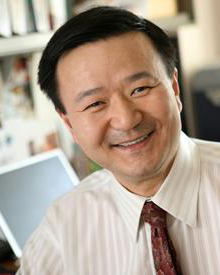
Jianmin Cui, Ph.D.
AIMBE College of Fellows Class of 2016 For outstanding contributions to the field of molecular and cellular bioengineering
The quest for safer, more effective drugs for irregular heartbeat
Via Washington University in St. Louis | April 7, 2022Irregular heartbeat, or arrhythmia, affects about 5 million people in the United States, and interestingly, some of the drugs used to treat the condition can also cause it. A biomedical engineer in the McKelvey School of Engineering at Washington University in St. Louis is going deep into the basic mechanisms that lead to arrhythmia to ultimately find potential new drug candidates.
Jianmin Cui, professor of biomedical engineering, will study the mechanisms of how voltage, a lipid known as PIP2 and a protein known as calmodulin (CaM) work together to activate the potassium ion channel in the heart that controls heart rhythm with a four-year, $2.5 million grant from the National Institutes of Health. By further understanding these ion channel mechanisms that control the electrical signaling in the heart, Cui and his team can look for target locations within the channel that may be a good site for new treatment options… Continue reading.
Compound may prevent risk of form of arrhythmia from common medications
Via Washington University in St. Louis | May 17, 2021Dozens of commonly used drugs, including antibiotics, anti-nausea and anticancer medications, have a potential side effect of lengthening the electrical event that triggers contraction, creating an irregular heartbeat, or cardiac arrhythmia called acquired Long QT syndrome. While safe in their current dosages, some of these drugs may have a more therapeutic benefit at higher doses, but are limited by the risk of arrhythmia.
Through both computational and experimental validation, a multi-institutional team of researchers has identified a compound that prevents the lengthening of the heart’s electrical event, or action potential, resulting in a major step toward safer use and expanded therapeutic efficacy of these medications when taken in combination… Continue reading.
An ‘unprecedented look’ into the protein behind hypertension, epilepsy and other conditions
Via Washington University in St. Louis | May 14, 2018 The seemingly unrelated conditions of hypertension, epilepsy and overactive bladder may be linked by electrical activity in a protein long studied by a biomedical engineer at Washington University in St. Louis.
The seemingly unrelated conditions of hypertension, epilepsy and overactive bladder may be linked by electrical activity in a protein long studied by a biomedical engineer at Washington University in St. Louis.
After new technology recently revealed the structure of the protein, the lab of Jianmin Cui, professor of biomedical engineering in the School of Engineering & Applied Science, will collaborate with two others to take an unprecedented look into its molecular mechanisms potentially leading to the development of new drugs for these and other conditions.
Cui has received a four-year, $2.9 million grant from the National Institutes of Health to study the BK (big potassium) channel proteins in collaboration with labs from the University of Missouri-Columbia and the University of Massachusetts. The labs will each play a role in identifying new compounds that could go into the drug development pipeline… Continue reading.
Jianmin Cui, Ph.D. To be Inducted into Medical and Biological Engineering Elite
Via AIMBE | January 20, 2016WASHINGTON, D.C.— The American Institute for Medical and Biological Engineering (AIMBE) has announced the pending induction of Jianmin Cui, Ph.D., Professor of Biomedical Engineering on the Endowment of Spencer T. Olin., Biomedical Engineering, Washington University in St. Louis, to its College of Fellows. Dr. Cui was nominated, reviewed, and elected by peers and members of the College of Fellows For outstanding contributions to the field of molecular and cellular bioengineering.
 AIMBE
AIMBE
